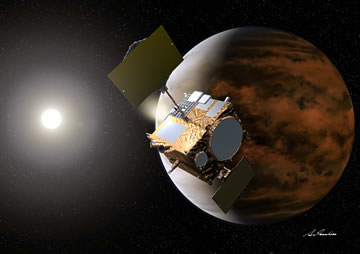The folks over at Ars Technica report that the Japanese Space Agency, JAXA, announced they are now accepting proposals for a microprobe that can hitch a ride with the Venus Climate Orbiter, Japan’s upcoming robotic mission to Venus. They will provide a free ride to either a low-Earth orbit or on a trajectory toward Venus. There are just a few requirements that JAXA has specified:
The launch booster for the Venus Climate Orbiter has room for one piggyback probe that can weigh up to 40 kilograms. It must fit into a 50x50x50 centimeter cube. After the microprobe is released, it will be on its own. JAXA will not assist with further correcting its trajectory or inserting it into an orbit around Venus.
The proposal must be submitted by a researcher based at a Japanese institution, and the mission will have to be managed in Japan. However, this does not preclude a Japanese team from collaborating with foreign researchers on a proposal. Also, all the documents for information and proposals are written in Japanese.
But if you’re in the market for a ride to Venus, the deadline for submitting your proposal is May 23, 2008. The announcement of JAXA’s micro-satellite program is posted here, and the specific announcement for piggybacking on Venus Climate Orbiter is here. The requirements for the micro-satellite and the application forms are found here.
Piggybacked micro-mission to a planet has been done before: NASA’s failed Mars Polar Lander mission had two accompanying microprobes, each weighing only 2.4 kilograms, that would have penetrated the Martian soil to take measurements if the mission had gone better. Mars Polar Lander and the two penetrator probes—named Deep Space 2—all failed independently of one another.
Original News Source: Ars Technica


Kudos to Japan for heading out with this. They need to build more probes and do more work in space.
So much more to reach.
1. Adam Says:
April 28th, 2008 at 4:02 pm
” Kudos to Japan for heading out with this. They need to build more probes and do more work in space.
So much more to reach.”
I couldn’t agree more Adam. All of these new contenders in space can only be good for science. I can imagine a not-too-distant future where there are getting towards ten space agencies regularly deploying missions. With so much to learn and to discover, space exploration is on the up-and-up!
Specifically in relation to the Venus Climate Orbiter, it’s great to see a mission that can build on the success of the Venus Express probe. They may not be the most glamorous missions, but they are doing, and will do, some great science.
So if i were to be cremated within the next few weeks and put myself into a small coffin no larger than 50x50x50cm, then I could be not only the first person to leave the earths orbit and land (hahah crash!) on another planet, but I would be the first to hitch-hike around the solar system. Maybe i should bring a book.
someguy, When hitch-hiking you should bring a towel!
But I somehow doubt that JAXA will favor some non-Japanese ashes to scientifically more interesting proposals, which I hope several will be made. The additional effort to offer such a ride is not neglectable, so kudos to JAXA.
I wonder….
How much do I weigh in kilograms, and how small of a ball can I put myself into?
Gene Shoemakers was the first person to have his ashes placed on the Moon with Lunar Prospector.
Pluto discoverer Clyde Tombaugh has his ashes aboard New Horizons, the first human to leave the Solar System, technically.
And there is a company in Texas that has been launching human ashes into space for a while. Star Trek’s Scotty was one of them.
Ay, laddie.
Clyde Tombaugh the first human to leave the Solar System, technically.
What? because of his ashes.
What about human skin or hair contamination on the voyagers or the pioneers? The respective hair and skin owners (are technically the among the first humans to leave the Sol System.